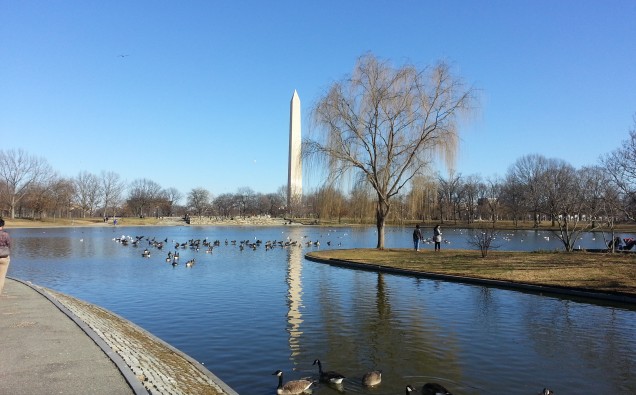
The United States experienced the warmest winter this year, partly due to a strong El Nino phenomenon, the National Oceanic and Atmosphere Administration says – indicating that the current year may be even hotter than last year – which had record high temperatures.
The traditional winter days may not be over yet. But they still look like they are gone, not long after the record snow blizzard. The weather continues to swing wildly.
On Tuesday, as the mercury suddenly soared into mid 70s Fahrenheit, the NOAA said average temperature for the contiguous U.S. during winter (December – February) was 4.6°F above the 20th century average, a new record, according to scientists from its National Centers for Environmental Information.
Until last weekend, people wore warm clothes but Tuesday felt like an advance spring day with a burst of sunshine. Next week may bring back some cool – setting in the spring ambience that comes with flower blooms, especially the Cherry blossoming landscape in Washington D.C.
But how to explain the weather pattern?
“Alaska had its second warmest winter on record. The winter precipitation total for the contiguous U.S. was 1.26 inches above the 20th century average, ranking as the 12th wettest winter on record for the Lower 48 states and the wettest since 1997/1998.”
Following early January’s massive snowstorm that covered much of Washington metro area, and the broader region under snow for several days, the weather institution said February average temperature for the Lower 48 states was 5.7°F above the 20th century average, which ranks as the seventh warmest February on record.
The February precipitation total was 0.20 inch below average, ranking near the middle of the 122-year period of record, the NOAA said.
Experts say temperatures are set to shoot this week to much above the typical mid-March levels in what is expected to be the hottest year on record.
Beginning with mid-70s, temperatures are forecast to cross the 80 degree Fahrenheit threshold in the middle of the week before a weekend shower brings the mercury close to normal average for this month.
The contrasting swings in weather come amid prediction of 2016 to be even warmer than the previous 2015 year, that the climate researchers NASA and the National Oceanic and Atmosphere Administration declared as the hottest year since record keeping began in 1880.
Record warming in 2015 is said to be the impact of El Nino phenomenon that remained in effect for most of the last year. Most of the warming happened in the past 35 years, according to NASA, with 15 of the 16 warmest years on record occurring since 2001.
The year 2016 could set an all-time record of being the warmest ever.
“Climate change is the challenge of our generation,” said NASA Administrator Charles Bolden at the launching of the report early this year, saying “now is the time to act on climate”.
The December global land and ocean average surface temperature was the highest on record for any month in the 136-year record. According to NOAA.
World leaders in December 2015 reached a landmark deal at the Paris climate summit to curb global warming, committing rich and poor nations to control rising carbon levels and calls for eliminating greenhouse gas emissions from human activity.
“Full implementation of this agreement will help delay or avoid some of the worst consequences of climate change, and will pave the way for even more progress,” President Obama said in his remarks at the climate.
While 2016 may top the record for being the hottest, the start of the year witnessed an “epic” snow blizzard in the eastern U.S. which dumped as much as four-feet of snow in some parts, and set a new record of ice accumulation for Washington D.C.
It was the worst since January, 1922 when Knickerbocker Blizzard brought 28 inches of snowfall in the capital. The storm was named after the then largest theater in Washington, which brought down its roof during a Jan. 28 evening showing, killing 98 people and injuring 133, according to reports.
The phenomenon of climate changes has potential consequences for weather in the United States and will have an impact on economic activity in many parts of the country.
Changes in Artic sea, for instance, has led scientific and policy attention on links to global climate change and projected ice-free seasons in the Artic within decades. The United States, by virtue of Alaska, is an Artic country and has substantial interests in the region. Besides the U.S., the other Artic states include Canada, Russia, Norway and Denmark.
The diminishing of Artic ice could lead in coming years to increased commercial shipping on two trans-Arctic sea routes – the Northern Sea Route and the Northwest Passage, according to a report released in January by Congressional Research Service.
“Changes to the Arctic brought about by warming temperatures will likely allow more exploration for oil, gas, and minerals. Warming that causes permafrost to melt could pose challenges to onshore exploration activities,” according to the report.
Increased oil and gas exploration and tourism (cruise ships) in the Arctic, in return, increase the risk of pollution in the region. Cleaning up oil spills in ice-covered waters will be more difficult than in other areas, primarily because effective strategies have yet to be developed, the report says.














